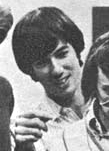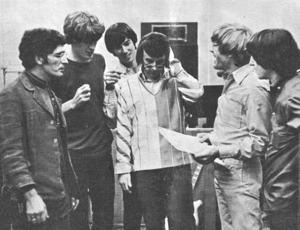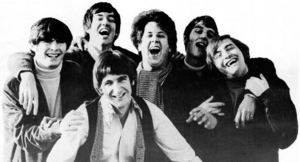Chip Douglas facts for kids
Quick facts for kids
Chip Douglas
|
|
|---|---|

Douglas with the MFQ and Phil Spector at Gold Star Studios in 1965
|
|
| Background information | |
| Birth name | Douglas Farthing Hatlelid |
| Born | August 27, 1942 San Francisco, California, U.S. |
| Occupation(s) |
|
| Instruments | Bass guitar, guitar, keyboards |
| Years active | 1966–present |
| Associated acts |
|
Chip Douglas, born Douglas Farthing Hatlelid on August 27, 1942, is an American musician, songwriter, and record producer. He became famous in the 1960s for his work with popular bands. He played bass guitar for The Turtles for a short time. Chip also produced some of The Monkees' biggest hit songs. These hits include "Daydream Believer" and "Pleasant Valley Sunday".
Contents
Early Music Career
Chip Douglas grew up in Hawaii. He started his music journey in high school. He formed a folk group called "The Wilcox Three." This group was inspired by another famous group, The Kingston Trio.
During a trip to California, a booking agency discovered them. They signed a deal with RCA/Camden to record an album. Chip used the name "Chip Douglas" for his performances. This name stuck with him for his entire career. Sometimes, he used his real name, Douglas Hatlelid, when writing songs.

After "The Wilcox Three" broke up, Chip formed a new group. It was called the Modern Folk Quartet (MFQ). He formed it with Cyrus Faryar and Henry Diltz, a famous rock photographer. Jerry Yester also joined the group.
Warner Bros. Records signed the MFQ. They recorded two albums: Modern Folk Quartet and Changes. The group also appeared in a movie called Palm Springs Weekend in 1963. They played themselves in a nightclub scene. For several years, MFQ toured the U.S., playing concerts at colleges.
In 1966, the Modern Folk Quartet signed with producer Phil Spector. They recorded a song called "This Could Be the Night." Spector co-wrote this song with Harry Nilsson, a rising singer-songwriter. The song was not released then, but Chip and Harry became good friends.
Later in 1966, Chip was part of a band called the Gene Clark Group. This band included Gene Clark from The Byrds. The group broke up by the end of the year. They did not record any music.
Joining The Turtles

When The Turtles' bass player left, Chip Douglas was asked to join. His first song with them was "Happy Together." The band decided to record it after many other artists had passed on the song. Chip played bass and helped arrange the music for the recording.
"Happy Together" became a huge hit for The Turtles. It even knocked The Beatles' "Penny Lane" from the number one spot on the American pop charts.
In early 1967, Michael Nesmith from The Monkees saw The Turtles perform. He asked Chip if he would produce music for The Monkees. The Monkees wanted to have more control over their recordings. Chip said, "I've never produced a record in my life." Nesmith told him not to worry. He promised to show Chip everything he needed to do if Chip left The Turtles.
Chip's last performances with The Turtles were in February 1967. Jim Pons replaced him as the band's bassist.
Producing The Monkees
Chip accepted Nesmith's offer and joined The Monkees in the studio. Their first project was the Headquarters album. They recorded it over six weeks in Hollywood. This was the first album where all four Monkees played on every song. Chip also played bass guitar on the album. He also wrote a song for it called "Forget That Girl."
Headquarters was released in the spring of 1967. It quickly climbed the music charts. It reached number one on Billboard's album chart. However, it was soon replaced by The Beatles' Sgt. Pepper's Lonely Hearts Club Band.
No singles from Headquarters were released in the U.S. But a song from the same recording sessions, "The Girl I Knew Somewhere," became a top 40 hit as a B-side. Chip also produced the hit song "Pleasant Valley Sunday." This song was written by Gerry Goffin and Carole King. Chip played bass on it. He also helped create the unique guitar intro played by Nesmith.
Chip produced The Monkees' next album, Pisces, Aquarius, Capricorn, & Jones, Ltd. He played bass on this album too. Unlike Headquarters, this album was recorded in different studios across the U.S. while The Monkees were on tour.
Chip also introduced The Monkees to new songwriters. One was John Stewart, who wrote "Daydream Believer." This song became The Monkees' second-biggest hit ever. It was included on their 1968 album The Birds, The Bees & The Monkees.
Chip also introduced the band to Harry Nilsson. Harry played some of his original songs for them. The Monkees covered one of these songs, "Cuddly Toy." It appeared on the Pisces album and in an episode of their TV show. Chip believes he helped Harry Nilsson get his big break in music.
Chip was happy to have made hit records with The Monkees. However, he was disappointed that people still thought The Monkees were not real musicians. The news media did not give them enough credit for their musical achievements.
Back with The Turtles
As 1967 ended, The Monkees wanted to control their music completely. They said goodbye to Chip Douglas. Chip then became a producer for The Turtles again. His first project was The Turtles Present the Battle of the Bands album. The title song was co-written by Chip and Harry Nilsson. This album also included two more top-ten hits for The Turtles: "Elenore" and "You Showed Me."
Chip had performed "You Showed Me" with Gene Clark in 1966. It was originally a fast song. But the slow, emotional version happened by accident. Chip was showing the song to singers Howard Kaylan and Mark Volman. He was playing it on an organ that was broken, so he had to play it slowly. Chip said, "This isn't the way it's supposed to sound." But Kaylan and Volman loved the new, slower tempo.
Reuniting with The Monkees
Chip stayed in touch with The Monkees. He returned in 1969 to record his song "Steam Engine" with Micky Dolenz singing. This song was later used in reruns of their TV show.
In 1976, Chip worked with Dolenz, Davy Jones, and Peter Tork again. They recorded the song "Christmas Is My Time of Year." Chip co-wrote this song with Howard Kaylan. By this time, Michael Nesmith was no longer with the group.
In 1986, The Monkees had a reunion tour. This brought new interest in the band. Rhino Records re-released all their original albums, including the ones Chip worked on.
Chip Douglas has appeared in several documentaries about The Monkees. He shares his memories about working with the band.
Later Career
In 1969, Chip produced Hand Sown...Home Grown. This was the first solo album by Linda Ronstadt, who was his girlfriend at the time.
The Modern Folk Quartet reunited in 1975. They started performing again, often at the Ice House in Pasadena, California. For several years, they also backed Dave Guard, a former member of The Kingston Trio. In the 1980s, the Modern Folk Quartet recorded several albums for a Japanese record company. They also toured Japan many times (in 1988, 1990, 2003, 2005, 2011, and 2016).
Chip Douglas continues to write and produce music in different styles. He divides his time between California and Hawaii.
See also
 In Spanish: Chip Douglas para niños
In Spanish: Chip Douglas para niños
 | Ernest Everett Just |
 | Mary Jackson |
 | Emmett Chappelle |
 | Marie Maynard Daly |

